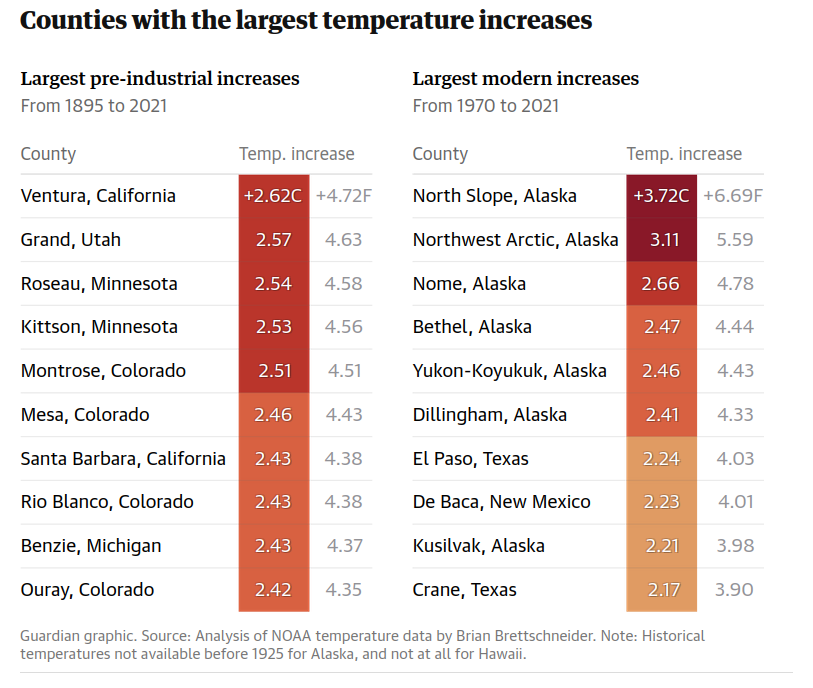Extreme Global Warming Has Come to the U.S.
- Thomas Neuburger

- Feb 8, 2022
- 3 min read

By Thomas Neuburger
In the climate-watching world, a great many observations these days fall into both of two camps. The first is the "Well, that's new" camp, and the second is "Haven't we heard that already?" You might think this a contradiction, but it's not.
Everything New Is Old Again
The "That's new" group includes all the observations that have never been seen before or are very rarely seen. These include the lowest-ever levels for glaciers:

and the lowest water level ever in places like Lake Mead, water source for Las Vegas:

and the drying up of the Colorado River system, primary source of water for many residents in six Southwestern states and parts of Mexico:

And yet all of these stories are also not new, since previous reports also carried stories of these same retreating glaciers, those emptying reservoirs, those same drying rivers — often many times. What's new is that they are retreating, emptying and drying to new levels. What's not new is that they have been retreating, emptying and drying for decades now.
Many Americans Face Extreme Warming Now
That applies to the following story as well. It's both strikingly new, and simply more of the same.
In an article entitled "A third of Americans are already facing above-average warming," the Guardian notes this important fact:
Temperatures in 499 counties across west, north-east and upper midwest US have already breached 1.5C (2.7F)
Warming of 1.5°C, globally averaged, is the latest (inadequately high) target set by the IPCC, the agency of the United Nations set up to combat climate change. (Their previous inadequately high target was 2.0°C warming, globally averaged.)
As the Guardian reports, more and more counties in the U.S. have breached that target (see chart above). And yet, constant incremental warming of the U.S. and the globe has been noted for so long — since at least 1988, if not earlier — that "Earth is warming" headlines are, frankly, nothing new.
Still, there's much to be learned from this report. For example, the greatest increases, as the chart above shows, are in the north, not the south.

That's because, of all the areas of the earth, the Arctic is heating the fastest, up to four times faster than the rest of the globe, according to some reports. Not good news for our friends in Montana, Minnesota, and New England.
And the place that's seen the greatest increase of all is Ventura County, set right next to the cooling waters and winds of the Pacific Ocean:
Mark Jackson, a meteorologist at the National Weather Service based in Oxnard in Ventura county said the county’s temperature increase was “a remarkable number, it’s a scary number when you consider the pace we are looking at”. Jackson said the county had een a large increase in heatwaves, including a spell above 37C (100F) last summer that “really stressed” the local community.
Ventura county, which hugs the Californian coast north-west of Los Angeles, is known for a pleasant Mediterranean climate cooled slightly by the proximity of the ocean. But Jackson said that recent heatwaves have seen warm air flow down from mountains in the nearby Los Padres national forest to the coast, while the ocean itself is being roiled by escalating temperatures. “It’s been really remarkable to see it get that hot right up to the coast,” he said.
California is also in the midst of a drought — no, that old story hasn't gone away yet either — which doesn't bode well for its future. And if you look at the Colorado River map above, you'll notice the dependence of the agriculturally important California central valley on the fast-drying Colorado River — not a good sign for one of its major industries. Imagine no food from California to anywhere.
Is There a Game On?
It's an interesting time we live in — tucked between the start of a world-historical global collapse and stories about it that are so old they sound, well, almost ordinary, almost not special at all.
The next phase of this interesting time, of course, will get everyone's attention, since it involves a scale of suffering that even the comfortable can't escape. But that's for later, of course — after it really will be too late for anyone to escape at all.
For now, though, simply note the contradiction. If it weren't so tragic, it would be the stuff of farce. But please don't dwell on this too long — you might miss the game.
(To read all of my work, visit God's Spies at Substack.com. More information here and here.)







it's called resonance. every push results in rising temps. every rising temp results in another, bigger push. a feedback loop.
and the arctic seems to be driving faster than the rest. Thawing permafrost and underwater clathrates are releasing "earth farts" containing prodigious amounts of formerly sequestered CH4, which is many MANY times as greenhouse efficient as CO2.
Another facet of the resonance is:
as temps rise, the capacity of the atmosphere to hold H2O also rises. And H2O is also a much more greenhouse efficient gas than CO2. More H20 means warming. warming means more H20. lather, rinse, repeat.
These are facts. parts of the very complex "system" of climate... all indicating ever increasing temps AND greenhouse conditions (lather, rinse…